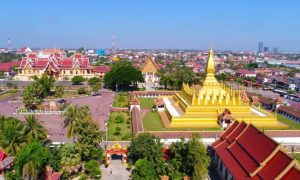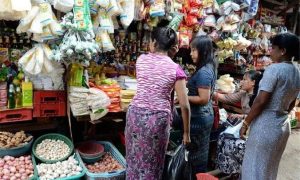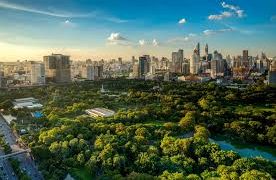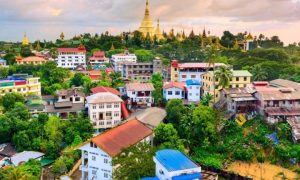In recent years, Myanmar, with its rapidly developing economy, rich natural resources and unique cultural atmosphere, has attracted an increasing number ofimmigrants.. For those planning to move to Myanmar, it is vital to understand the cost of living, employment opportunities and how to adapt to the culture. This article will provide you with a comprehensiveLife as an immigrant in MyanmarTips to help you better integrate into this fascinating country.
I. Cost of living in Myanmar
Migration to MyanmarThe first step is to understand the cost of living so that you can plan your budget wisely. Overall, the cost of living in Myanmar is relatively low, but specific expenses will vary depending on the region and lifestyle.
1. Housing costs
- rents: The monthly rent for renting an ordinary apartment in Myanmar's capital, Naypyidaw, or its largest city, Yangon, ranges from $200 to $500. Upscale homes or furnished apartments may cost upwards of US$1,000.
- buy a house: There are restrictions on foreigners purchasing property in Myanmar and most migrants opt for long-term leases. If you are considering investing in real estate, you need to go through legal channels and meet certain conditions.
2. Food and Diet
- Daily Diet: Fresh fruits, vegetables and food are very affordable at local markets, with a family spending about $100 to $200 per month on food.
- dine out: The cost of a meal in an ordinary restaurant is about 2 to 5 dollars a meal, while spending in an upscale restaurant is about 10 to 20 dollars.
3. Transportation costs
- mass transit: Public transportation is relatively inexpensive, with city bus fares usually less than $1.
- (Taiwan) rental car: Taxis start at about $2 and are charged according to the distance traveled.
- private car: Imported vehicles are more expensive and subject to high tariffs if one plans to buy a private car.
4. Other expenses
- medical care: Basic medical costs are low, but medical facilities are limited and international medical insurance is recommended.
- teach: For international schooling, tuition fees range from $5,000 to $15,000 per year.
- Internet and Communications: Internet and cell phone packages are about $10 to $20 per month.
II. Employment opportunities in Myanmar
As a developing country, employment opportunities in Myanmar are gradually increasing, especially in the following areas:
1. Popular Industries
- Infrastructure development: As Myanmar's infrastructure continues to improve, there is a strong demand for people in construction, engineering and related fields.
- Energy and resource development: Myanmar is rich in natural gas and mineral resources, making it an ideal choice for those working in the energy industry.
- Tourism and Hospitality Management: Myanmar's rich cultural heritage and natural beauty have attracted a large number of tourists and boosted tourism.
- Education and language training: Expatriates who speak English or Chinese can find teaching opportunities in language training and international schools.
2. Work Visas and Conditions of Employment
Working in Myanmar requires a work visa and the support of a local employer. It is advisable to look for job opportunities and sign an employment contract in advance to ensure a smooth application process.

3. Entrepreneurial opportunities
Myanmar's economic reforms provide good opportunities for entrepreneurs. Popular areas of entrepreneurship include food and beverage, retail, digital services, and green energy. The Myanmar government offers some tax incentives to foreign investors, subject to local laws and regulations.
III. Cultural adaptation and integration
Cultural differences are one of the key challenges to overcome when moving to Myanmar. Understanding the local culture and learning to assimilate is the key to a successful life.
1. Religion and social customs
- religious belief: Myanmar is a Buddhist country and its inhabitants practice Buddhism and adhere strictly to religious customs. Respect the Buddhist culture by removing shoes and dressing appropriately when visiting temples.
- social etiquette: The Burmese emphasize politeness and humility and usually use the greeting of folded hands when meeting.
2. language learning
The official language of Myanmar is Burmese, but English is also more common in business and international communication. Learning some basic Burmese will help with daily communication.

3. food culture
The Burmese diet is based on rice, supplemented by curries and various vegetables. Immigrants can try to assimilate into the local diet, but Western and Chinese food can also be found in major cities such as Yangon.
4. Climate adaptation
Myanmar has a tropical monsoon climate, which is hot and humid all year round, with a long rainy season, especially in the summer. Newcomers to Myanmar need to get used to the heat and humidity, and take care to protect themselves from the sun and mosquitoes.
IV. Practical advice on moving to Myanmar
1. Finding a Social Circle
Joining a local expat community, community event or interest group can help you integrate more quickly.
2. Legalized status
Immigrants are required to promptly apply for residence registration, tax registration and other necessary legal procedures to ensure that their status is legal.
3. Meeting the challenges
While Myanmar offers many opportunities for migrants, there are some challenges, such as inadequate infrastructure and limited medical resources. It is important to prepare in advance and seek out reliable support resources.
4. Planning for the long term
Whether it is employment, education or health, immigrants are advised to plan adequately for the long term, including purchasing insurance, finding stable housing and making plans for their children's education.
V. Summary
Immigration to MyanmarIt is a journey full of opportunities and challenges. By planning your costs wisely, taking advantage of employment opportunities and adapting to the local culture, you can better integrate into life in Myanmar. In this uniquely fascinating country, immigrants not only experience a rich culture, but also open up new horizons for individuals and families.
We hope that the full guide in this article will provide you with practical guidance and help you start a successful and enjoyable journey to a new life in Myanmar!






